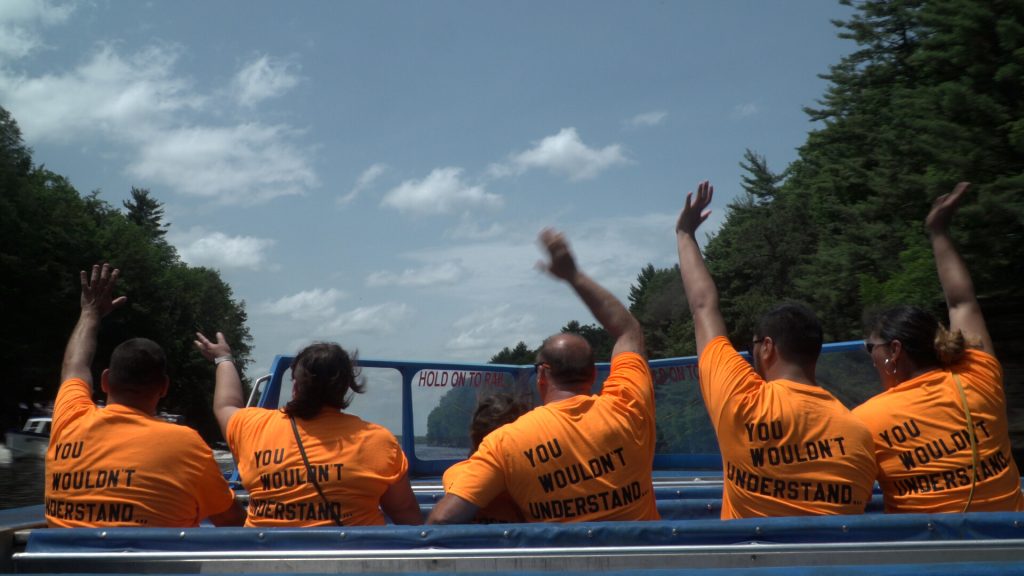‘The Dells’ Is A Canny, Very Wisconsin Docu-Film
And 'Cycle' is a hard look at 2019 police killing of Black youth in Racine.
As they grow in reputation, regional film festivals can single out local achievements and talented film-makers, and the Milwaukee Film Festival – April 24 to May 8 at the Oriental and Downer theaters — definitely has such films, and a category called “Cream City Cinema.”
I will preview several of them below, but first I want to review a film I chose based on the reputation and quiet technique of director Nellie Kluz: she has done several “little” documentaries of note.
Some viewers may think she just “points the camera and look what I found.” In reality Kluz moves the camera around a lot, carefully edits for contrasting visuals or deliberately lingers in a dark place and asks us to listen. Her so-called “found” technique is hardly random. She is controlling us and our vision so that without narration we see the people and places she wants us to.
It’s sneaky because she doesn’t tell us what to think but shows us those moments that lead to a conclusion. It’s not an intellectual documentary, so its matter-of-factness does creep into our minds. Which brings us to her film that is part of the Milwaukee festival. The Dells (2023) is hardly a pleasant travelogue about Wisconsin’s beloved tourist area of waterparks and dining places. It lingers on the garish commercialism, but also shows the beautiful, wooded landscapes and splashy tourist destinations. She stays here and then moves unexpectedly there.
It’s a short film by today’s standards (72 minutes) and has no narration, except for a garrulous know-it-all taxi driver for the summer workers and the tourists. He chats about the best places to work as well as the best spots to forage. He drives groups back and forth between motels and Walmarts, giving advice along the way.
The people he talks to are often international students on a temporary J-1 visa, coming from Europe, Asia and South America to make money at the low-paying jobs needed at motels, dining places and sometimes the famous waterparks (where the taxi driver warns jobs are harder and pay less).
The languages are a mix of English, Spanish and Turkish, and the English subtitles are only partly present, leaving the audience to figure out that the Turkish students are living in a beat-up van, rolling up cigarettes and blowing up air mattresses. The workers mainly talk about the best places to work, the occasional racist treatment, and which jobs are paying the best money. Money makes their world go round. The world of politics seems far away. But on the whole the Dells tourists and natives don’t come off looking that bad to college-age youths on J-1 visas, since they came to do menial work and have time to enjoy the tourist attractions, from the underside as it were.
The documentary cannily shows us what to watch and figure out. What most viewers will figure out is that these workers interact much like adolescents everywhere, consumed by cars, clothes and hourly wages. You might wish they had deeper political instincts, but it’s mainly makeup and idle chat that they engage in constantly on cell phones.
Wisconsin has long known that its state’s summer tourism relies on these immigrant workers who clean up after us. The movie doesn’t deal with the new reality facing the nation’s visa holders under the Trump administration. Without clarification, dozens on many campuses, including UW-Madison, are discovering their visas revoked and they are deported, no matter how they thought they were doing in school.
There are lawsuits against this and there have been stories from other Wisconsin communities than the Dells about the growing worries. The Sheboygan Press recently noted that “the future of immigrants’ contributions to the statewide economy is uncertain in wake of President Donald Trump’s aggressive immigration executive orders. Anxiety and fear are palpable, regardless of immigration status.” Door County media has also done stories about the summer employment concerns in that popular vacation area. So has WUWM radio.
The Dells doesn’t deal with any of this – at least not directly. Since the students involved are not named (and worked a summer or two ago) it is hard to follow up in any intelligent way. But recent events have added a new wrinkle to a gentle but pointed look at a Wisconsin cultural reality.
The Dells will be shown at 6:30 p.m. Tuesday, April 29, at the Oriental Theatre and at 3 p.m. Tuesday, May 5, at the Downer Theatre.
I didn’t get to screen the other Wisconsin based documentaries that jumped out at me, but I’ll detail them here. One involves an East Side street my family and I have visited often over the decades it was growing.
Brady Street: Portrait of a Neighborhood (2024) is an area I know well and since the 1960s have watched it grow (and sometimes fade) as a hub of counterculture, more dining than tattoos, but certainly a community mix with its own lively summer street festival and a growing attraction to families.
There were determined efforts by the community (one leader, Julilly Kohler, is interviewed in the film) to revitalize it. What once was a side street is now a busy community haven. And this is truly a home-made local film, directed by Sean Kafer, now film teacher and program director at the UWM Peck School of the Arts.
The Milwaukee Film Festival will show it at 3:30 p.m. Friday, May 2, at the Oriental Theater and also at 12:30 p.m. Sunday, May 4, and at 8:30 p.m. Wednesday, May 7, at the Downer Theater.
Also, while I always thought of Green Bay as the home of the Packers and not as a thriving punk rock community, along comes a documentary that intends to change my mind. Green Blah! The History of Green Bay Punk Rock (2024) suggests that, aside from football and paper mills, Green Bay should be recognized for a thriving punk rock scene with fierce support for its local bands. Directors Christopher Pretti and James J. Baker promise a hard visual ride.
The festival will show the documentary at 8:15 p.m. Friday, April 25, and at 8:45 p.m. Wednesday, April 30, at the Oriental Theater.
In another category entirely is a film called Cycle, which has hired its own PR firm to address the importance of its national issue — patterns of police violence against young blacks. But it is also very local, built around an almost forgotten Racine event in 2019 — the police killing of 18-year-old Ty’Rese West. To the film-makers this is an issue that should have dominated newspaper headlines for decades, but didn’t.
Directed and produced by Laura Dyan Kezman with co-director William Howell, Cycle uses archive video, active interviews and hashtag connectives, welcoming the collaboration of the Ty’Rese West family, which has pursued lawsuits involving West’s death. He was stopped for riding a bike without headlights, ran away and was pursued and killed. Police said he had a gun. The officer in the case was acquitted. The family filed lawsuits and, according to reports, received a small payment and a promise to build a memorial to West.
In its trailer and publicity, the film calls for the community to listen: “Now in a moment when corporations are rolling back DEI initiatives and anti-woke rhetoric is trending, the cumulative effect is especially devastating, leaving viewers wondering what more it will take for the cycle of unchecked police violence to end.”
On Sunday, May 4, a showing at 1:45 p.m. at the Oriental Theatre will include a talkback with the film-makers and West’s family. Other showings are at the Downer Theatre: 3 p.m. Tuesday, May 6, and 3 p.m. Wednesday May 7.
Dominique Paul Noth served for decades as film and drama critic, later senior editor for features at the Milwaukee Journal. You’ll find his blog here and here.
Movies
-
Republican Legislators Push Tax Credits for Films Made in Wisconsin
 May 21st, 2025 by Baylor Spears
May 21st, 2025 by Baylor Spears
-
Mystery Movie Being Filmed in Milwaukee With Kevin Spacey
 Apr 24th, 2025 by Jeramey Jannene
Apr 24th, 2025 by Jeramey Jannene
-
Two Documentaries Offer Lessons in Fame
 Apr 24th, 2025 by Dominique Paul Noth
Apr 24th, 2025 by Dominique Paul Noth




















